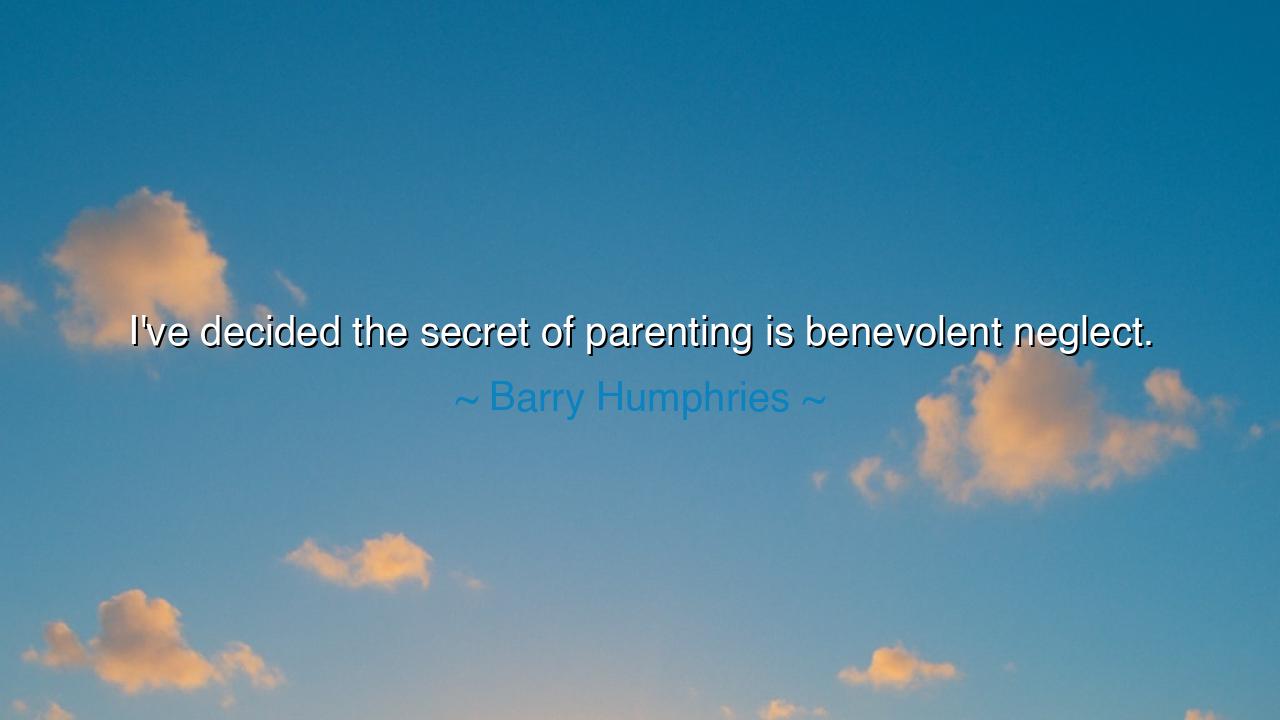
I've decided the secret of parenting is benevolent neglect.






The words of Barry Humphries—“I’ve decided the secret of parenting is benevolent neglect.”—are sharp, paradoxical, and yet heavy with wisdom. At first, they may sound harsh, for the word neglect carries with it the sting of abandonment. But Humphries adorns it with the crown of benevolence, and in so doing transforms its meaning. He speaks not of cruelty, nor of cold indifference, but of the wise restraint that allows children to grow by their own strength, to stumble and rise, to discover their place in the world without the constant hand of a parent pressing upon them.
The ancients knew this truth well. In Sparta, children were not coddled, but tested—left to endure hardships that forged resilience. In Rome, young men of noble houses were sent into service, expected to learn leadership not by shelter but by struggle. This form of benevolent neglect was not a withdrawal of love, but a deliberate act of trust: trust that the child’s spirit must be tempered like steel in the fire, not forever wrapped in silk. Humphries, with humor and honesty, points to the same eternal lesson: too much interference smothers, while carefully measured distance liberates.
History gives us many examples. Consider Queen Elizabeth I, who as a young princess endured uncertainty, exile, and even the threat of death. She did not grow up under the protective shadow of constant parental guidance, for her father, Henry VIII, was more tyrant than tender, and her mother, Anne Boleyn, was taken from her too soon. Yet through this rough and uncertain upbringing, Elizabeth developed a resilience and independence that would one day allow her to reign with wisdom, cunning, and unmatched strength. Her life shows how hardship, when not crushing, can shape greatness—an embodiment of benevolent neglect in practice.
Humphries’ declaration is also a warning to the modern age, when parents often drown their children in attention, filling every hour with schedules, lessons, and constant supervision. In their zeal to protect, they sometimes rob the child of the very experiences that build self-reliance. Benevolent neglect does not mean refusing care; it means knowing when to step back, when to allow silence, boredom, or challenge to do their sacred work. For it is often in solitude that imagination is born, in struggle that courage awakens, and in small failures that wisdom begins to take root.
The meaning, then, is clear: parenting is not the art of constant control, but of balance. Too little care, and the child withers. Too much care, and the child never learns to walk on their own. The secret lies in benevolence—a love so deep that it dares to hold back, to give space, to trust the child’s inner strength. This is not neglect in the cruel sense, but a discipline of the heart, where the parent accepts that their role is not to solve every problem, but to allow their children to discover their own solutions.
The lesson to be drawn is powerful: parents must learn to trust. Trust the resilience of their children, trust the wisdom of struggle, trust that love does not always mean interference. Like gardeners, they must water and nourish, but they must also step back and let the roots reach down on their own. The oak does not grow tall by being sheltered from every wind; it grows tall by standing in the storm. So too must children face the winds of life if they are to stand strong in their own right.
Therefore, let your actions be these: resist the urge to overprotect. When your child stumbles, let them rise. When they are bored, let them dream. When they fail, let them feel the weight of it, even as you remain near to encourage. Guide with love, but also with distance. Be present, but not oppressive. Step in when truly needed, but step back when the lesson must be learned through trial.
Thus, Barry Humphries’ words endure as a paradoxical truth: the secret of parenting is not in holding tightly, but in letting go wisely. To practice benevolent neglect is to love with courage—to accept that children are not possessions to be molded, but souls to be strengthened by their own journey. And in that balance of presence and absence, guidance and freedom, lies the ancient art of raising human beings who can stand tall, strong, and free.






AAdministratorAdministrator
Welcome, honored guests. Please leave a comment, we will respond soon